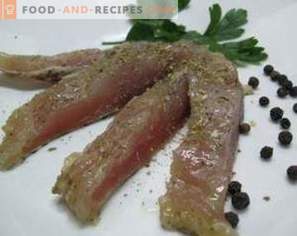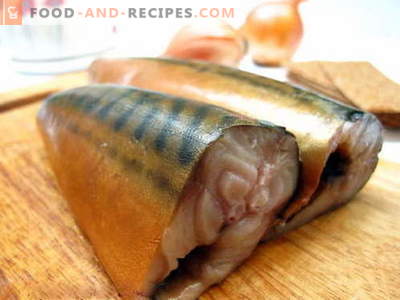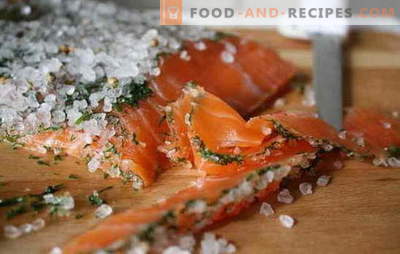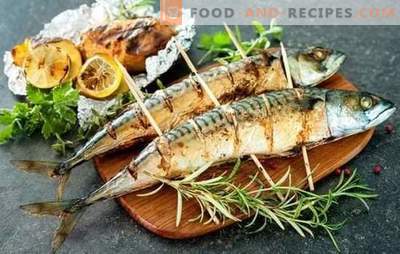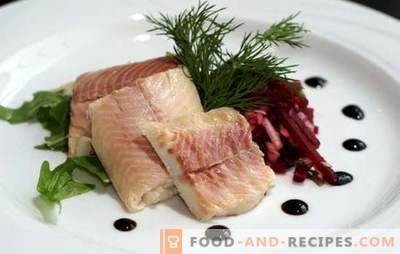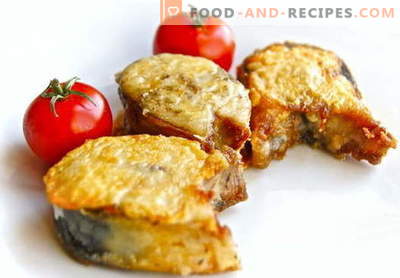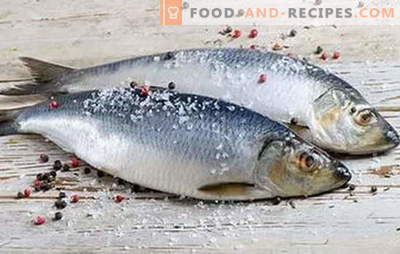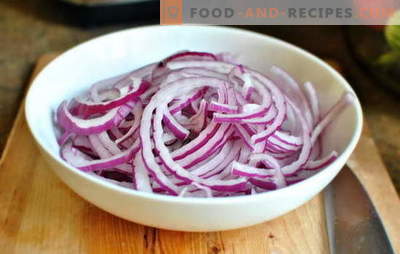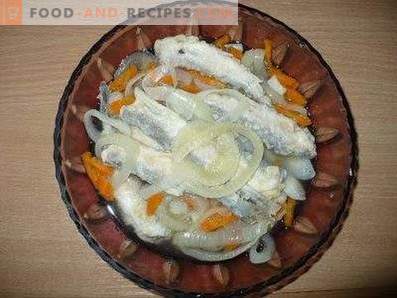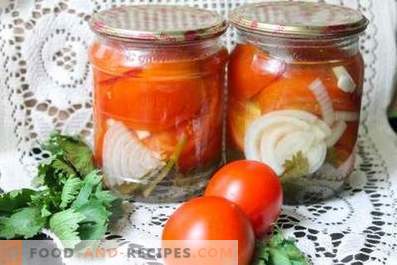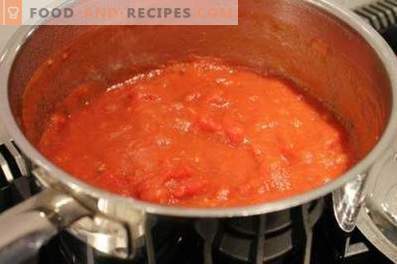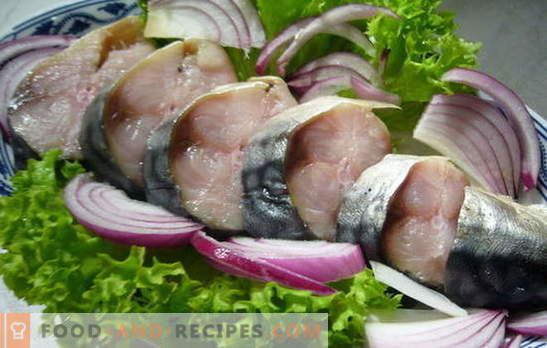
Pickled fish is both tasty and healthy at the same time.
Along with vegetables and fruits, you can eat it a lot, especially not worrying about the extra calories.
In addition, fish slows down the aging process, lowers blood pressure and prevents the development of cardiovascular problems.
Eating it twice a week can improve eyesight, skin condition and normalize blood sugar.
The dish is prepared not only on ordinary days. It is appropriate on the holiday table.
Marinated fish can be eaten as a sandwich, or cut into a salad. It becomes even tastier if you bake the carcass on the grill or cook the kebabs out of the pieces.
But if it is so popular, why not pickle fish in the home kitchen?
Marinated fish - general cooking principles
For marinating, you can use any type of fish. It is desirable only that the bones were smaller, and the carcass - dense and fat.
If the fish is frozen, it must first be defrosted, but not completely.
A small fish marinated without cutting. Most need to gut, separate the head, tail and fins. Be sure to wash under running water.
As a rule, the fish is released from the ridge and the fillet remains. On it, small bones are removed with tweezers. The fillet is cut into pieces with a thickness of one and a half to two centimeters and then marinated.
You can cook the whole fish and the middle fish, making cuts along the carcass.
You must first prepare the dishes of the right size. Useful and sharp knife with a comfortable handle.
Marinated fish, both cold and hot. Vinegar is found in most recipes. But you can successfully do without it, replacing it with spices, lemon or soy sauce.
In the process of cooking, coriander, black and fragrant pepper, bay leaf, sugar, sea or rock salt, onions are used. Mustard, cumin, ginger, carrot and oranges are also added. Marinated fish is stored in the refrigerator under the closed lid.
1. How to pickle fish at home with vodka
This recipe is most suitable for marinating red fish. The finished dish is not only pleasant in appearance and smell, but also very tasty.
Ingredients:
• Kilogram of fish fillets.
• 50 grams of dill and cilantro.
• Celery stalk.
• Two garlic cloves.
• Onion.
• Art. spoon of olive oil.
• 0.150 ml of vodka.
Cooking Method:
Fish fillets generously salt.
Grind greens, celery and garlic. Put them on the bottom of the container for pickling.
Cut the onion into half rings. Pour it into the container, disassembled on the feathers. Salt and mix with your hands, slightly pressing down on the ingredients.
Pour the oil and place a piece of fish on top.
Put onion fillet, celery and a few sprigs of dill.
Pour vodka. Leave in the fridge for a day.
Served with green salad and capers. It is appropriate to add cherry.
2. Marinated fish: mackerel per hour
I want to pickled fish, but it takes a few hours to cook? Yes, less than an hour to cook!
Ingredients:
• Two mackerel fillets or one fish.
• Two onions.
• 10 grams of coriander.
• A glass of orange juice.
• One orange.
• Salt.
• Celery stalk.
• A mixture of peppers.
• Refined olive oil.
Cooking Method:
Mill mackerel, remove all bones. Place the skin down into the container. Salt copiously on both sides. A little pepper and sprinkle coriander beans.
Rearrange in the fridge for half an hour.
Remove the zest from the orange and pour it with boiling water through a sieve to get rid of the bitterness.
Grind onions with a blender and send it to the pan.
Cut the celery into small straws and pour it over the frying pan with onion. Pass two minutes.
Add the zest and pour in the orange juice. Five minutes boil.
Mackerel pour hot marinade and send in a cold place for forty minutes.
3. How to Marinate Fish at Home in Dutch
A lightly salted fish is a pleasant and almost dietary light dish. Calories in it is not very much.
Ingredients:
• Two fillets.
• Onion.
• Carrot.
• Lemon.
• Two teaspoons of sugar sand.
• Four leaves of Lavrushka.
• Ten peppercorns.
• Sea salt.
Cooking Method:
Release fish fillets from small stones, cut into slices. Put in a bowl for pickling, lay a laurel and salt.
Cut lemon and onion into half rings. Turn carrots into straws using a blender or coarse grater.
On the surface of the fish pour sugar. Top with a layer of carrots, sprinkle peas peppers. Then spread out a layer of onions and a layer of lemon.
Leave in the fridge for a day.
4. Marinated Estonian Fish
The recipe will appeal to those who love pickled fish moderately salty.
Ingredients:
• One fish.
• Onion.
• Five teaspoons of apple cider vinegar.
• Two tsp of sea salt.
• One teaspoon of sugar.
• 250 ml of warm water.
• Ten peppercorns.
• Pinch of coriander.
• 0.050 kg of dill.
Cooking Method:
Prepare the fish fillet and cut into two centimeter slices.
Cut the bulb into semi-shellfish.
Pour sugar and sea salt into warm water. Pour apple cider vinegar.
Put the fish pieces in a jar or bowl. Sprinkle with onions and mix.
Top toss coriander and peppercorns. Triturate with chopped greens. Pour the marinade. Send for a day in the fridge.
5. How to Marinate Fish at Home in Japanese
Appetizing fish pieces in a sour-sweet marinade will delight guests and home with its delicate and pleasant taste.
Ingredients:
• Fish fillets.
• Onion.
• Carrot.
• 0.100 kg of sugar sand.
• 0.150 L wine vinegar
• 0.050 L soy sauce.
• Five bay leaves.
• One teaspoon dried ginger and mustard seeds.
• Ten peppercorns.
• Sea salt and herbs to taste. Cooking Method:
Fish fillet cut into pieces. Salt on both sides.
Pour wine vinegar into a saucepan. Add soy sauce and sugar. Stir and bring to a boil.
Remove the stewpan from the heat and add ginger, Lavrushka, black pepper and mustard seeds. Let the marinade cool to room temperature.
Cut the onion into rings. Turn carrots into straws using a blender.
We invest in glassware with bowls: onions, fish fillet pieces, carrots. Fill with cooled marinade. Add chopped greens.
Leave in a cold place for eight to twelve hours.
6. Marinated fish: a universal recipe
In this way, you can marinate not only sea fish, but also river fish, such as silver carp.
Ingredients:
• Kilogram of fish.
• Sunflower oil.
• Onion.
Marinade (per liter of water):
• 0.100 kg of salt.
• 0.100 kg of sugar sand.
• 100 ml of vinegar.
• Three bay leaves.
• One teaspoon of coriander beans.
• Ten black peppercorns.
• Five sweet pea peppercorns.
• Six pcs. carnations.
Cooking Method:
Put on the fire water in a saucepan. As soon as it boils, throw all the ingredients in the marinade, except vinegar. Stir and turn off after dissolving sugar and salt. Cool to room temperature.
Fish free from the bones and cut into pieces two centimeters wide.
In the cooled marinade pour vinegar. Mix.
Soak the fish so that it is completely covered with marinade.
Dishes close and place in a cold place for a day.
After a specified time, the marinade can be drained.
Cut the onion into half rings.
Place the fish and onions in layers in a glass dish. Each bowl pour over the sunflower oil.
7. How to pickle fish at home under the yoke
A simple and quick way to pickle fish with aromatic spices and spices. The recipe is perfect for herring and sprat.
Ingredients:
• One kg of large herring.
• Ten peas each, black and fragrant. • Two pinches of coriander.
• 1/2 teaspoon jeera.
• Four leaves of Lavrushka.
• Three tablespoons with a hill of sea salt.
• Art. spoon of sugar and vinegar.
• 50 grams of vegetable oil.
Cooking Method:
Put the fish in a deep bowl in layers.
Pour a liter of water in a saucepan and throw peppercorns, coriander, cumin and bay leaves. Add sea salt and sugar. Stir and add vinegar.
Marinade boil and pour in vegetable oil. Cool it down.
After the marinade reaches room temperature, pour it into a bowl of fish.
Cover with a plate and press so that it drowns in the marinade. Top put something weighing about a kilogram. Leave the dishes with fish under the yoke for a day.
Then move to the fridge and enjoy the tasty fish.
8. Marinated fish in Latvian
An easy recipe for marinating your own fish. It will take a lot of time, but the finished dish will not disappoint with aroma and taste. Pieces of fish just melt in your mouth.
Ingredients:
• One fish.
• 50 grams of salt and sugar.
• 0.75 ml of warm water.
• 50 grams of vinegar.
• A teaspoon of sugar.
• 50 grams of vegetable oil.
• 1/2 teaspoon of ground pepper, ginger and coriander.
• Red onion.
Cooking Method:
Free the fish from the bones, chop and put in the vessel.
Dissolve salt in water.
Pour the fish with salt solution and leave for a day in the refrigerator.
The next day, prepare the marinade: mix the sunflower oil with vinegar and sugar. Add spices and mix.
Put onion rings and slices of fish in prepared container.
Pour the marinade on top, close the lid and mix the contents. Leave for a day in the refrigerator.
9. How to Marinate Fish at Home for Grilling
For this recipe, it is best to marinate mackerel. Grilled fish is surprisingly juicy and tasty.
Ingredients:
• Six fishes.
• 30 grams of lemon juice and sunflower oil. • Onion.
• Seasoning for fish.
Cooking Method:
Prepare the fish, butchering it.
Make cuts on the carcass every two centimeters. Fold in a deep saucepan.
Chop the onion in a blender.
Mix the juice with sunflower oil.
Pour the onion into the saucepan with the fish. There also pour a mixture of juice and oil. Fill with seasoning for fish. To mix everything.
Leave to marinate for ten to twelve hours.
Finished fish can be baked on the grill, oiled.
Marinated fish - tips and useful tips
- Do not cut the fillets into small and thin pieces. Under the action of the marinade, they will become porridge.
- River fish has a characteristic smell of mud. To get rid of it you need to wash the carcass under running cold water and soak for half an hour in a strong salt solution.
- To speed up the defrosting process, the fish should be put in a bag and loaded into cold water.
- Do not add more vinegar to the marinade than is required in the recipe: the dish may be too sour.
- But it is not necessary to over-salt it. Fish do not absorb excess salt.
- Fillets can be cut into pieces at a bit of an angle. This will speed up the marinating process.
- For storing the finished product, it is advisable to use glass jars or containers with a tight lid. This will increase the shelf life and protect against odor spreading to other foods.

